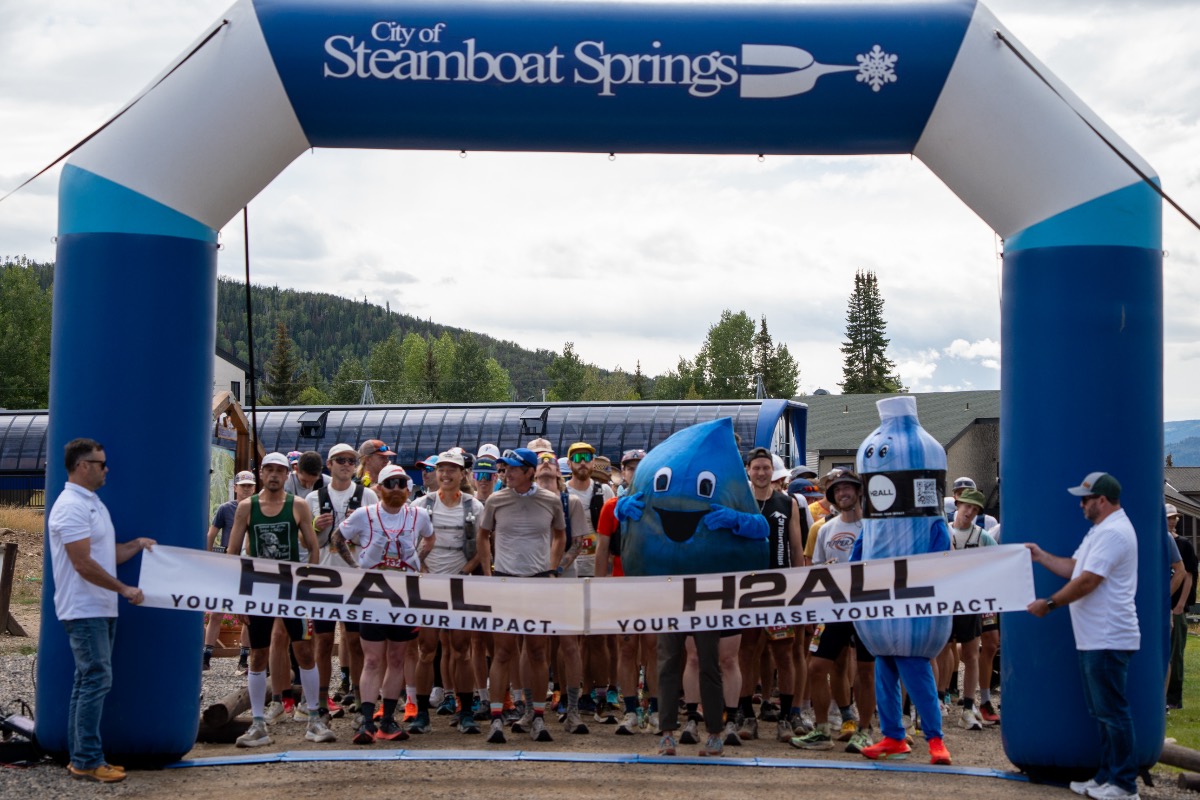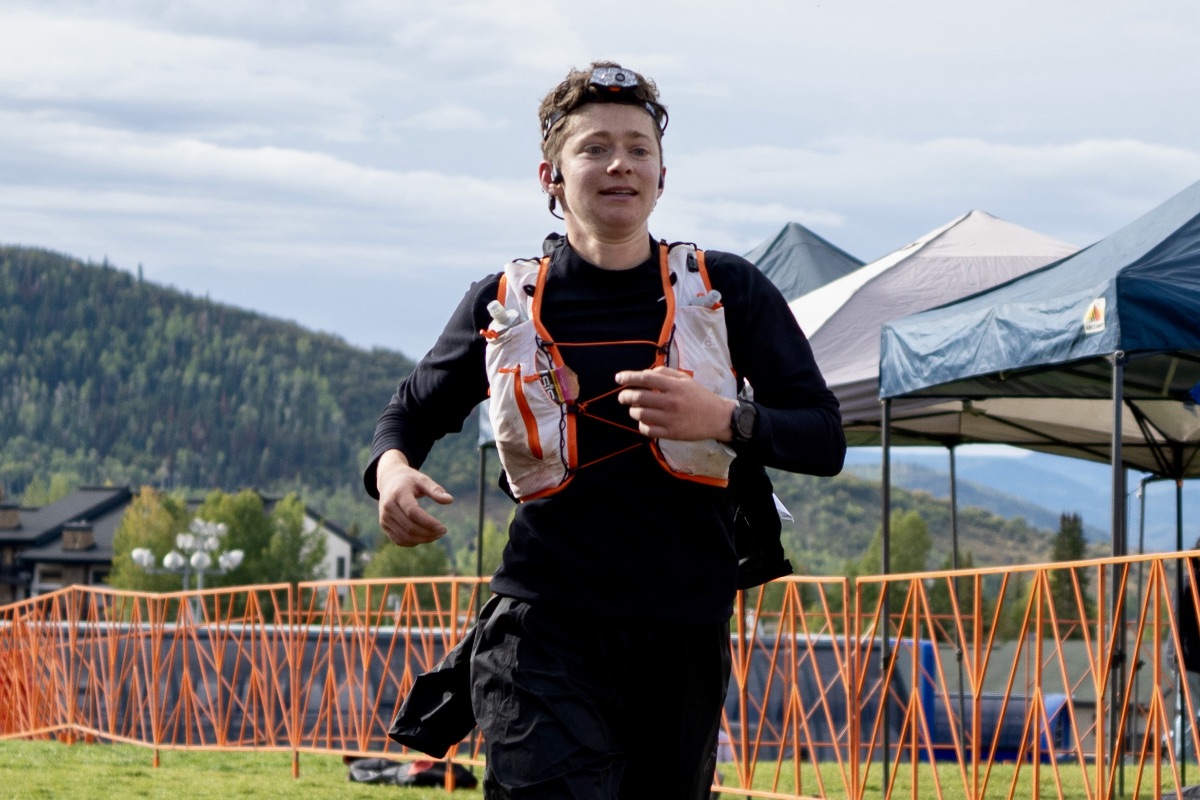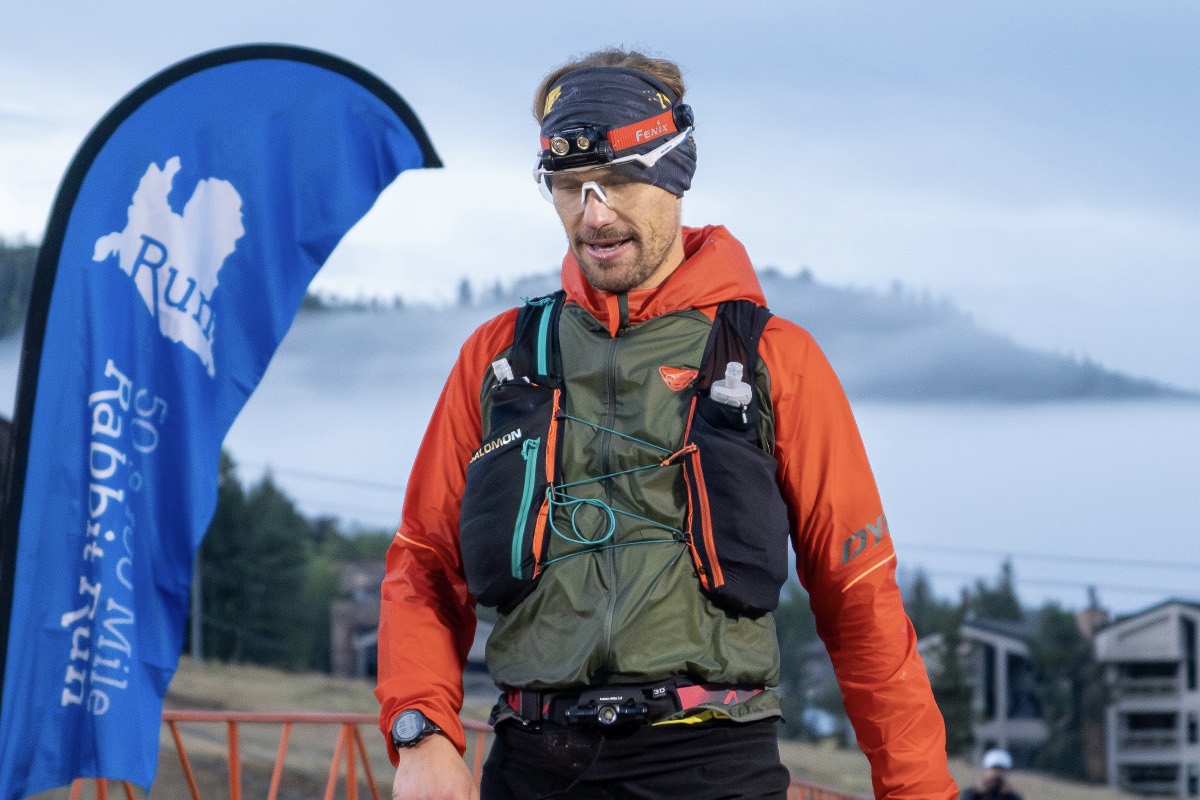It’s mid-September, the aspens are turning yellow in Colorado’s higher elevations, and a crispness has arrived in the mountain air — it’s 2025 Run Rabbit Run 100 Mile time!
Women’s champion Riley Brady and men’s winner Jesse Rich both practiced early race moderation and second-half strength to win their respective races, while dynamic races for the women’s and men’s podium positions unfolded behind them.
The Run Rabbit Run 100 Mile course is roughly 101 miles long and has around 16,000 feet of climbing. It takes place at altitudes ranging from about 6,600 to 10,600 feet, in the mountains around Steamboat Springs, Colorado.

The start of the 2025 Run Rabbit Run 100 Mile. Photo: Kellie Thompson/Hidden Antelope Photography/@hiddenantelope
Fans of this event have come to know and love its two race starts, one for the swiftest “hares,” the group from which the winners emerge, and another for the steady “tortoises.” In total, 450 runners participate across both starts. The hares’ race began on Friday, September 12, at 1 p.m. local time and has a 30-hour cutoff.
Runners experienced mixed weather conditions, including a calm, cool fall Friday afternoon, several hours of violent storms on Friday late afternoon and evening, a chilly but drier overnight, and even a bit of sun on Saturday morning. As they say in Colorado, if you don’t like the weather, give it a minute, and this was the character of this year’s race weather — some of everything.
This event hosts a massive prize purse, with $20,000 going to the women’s and men’s winners, prize money seven deep in both the women’s and men’s races, and a host of other dollars doled out for preems, a team event, and masters and senior runners.
Read on to find out how the women’s and men’s races played out.
2025 Run Rabbit Run 100 Mile Women’s Race
While she would not ultimately prevail, Mary Denholm put her stamp on the first half of the women’s race. From the get-go, Denholm led up the first stiff, ski-slope climb and passed through the first aid station at Mount Werner (5.2 miles) with a three-minute lead. She increased her lead through the first third of the race, to the Summit Lake aid station (mile 30.1), where she was running over 30 minutes faster than course record pace, set last year by Emilie Mann on her way to finishing in 19:48:05.
During the race’s first third, Riley Brady and Becca Bramley ran in second and third place, seemingly working together for long stretches, coming into aid stations together or near each other. Despite the long gap to leader Denholm, they weren’t slouching on effort, with their splits running close to Mann’s record paces.
Things changed quickly with both the weather and the women’s race between mile 30.1 and the Dry Lake aid station (mile 44.5). It was here that the skies opened up to deliver an early evening storm, and Denholm arrived to Dry Lake looking like the weather had taken a toll. It was there that the women’s race transitioned into its second act, as Denholm dropped from the race and Brady moved into the race lead with Bramley chasing in second. Behind them, a large gap opened to the rest of the field, with Jennie Yeaman, Mckendree Hickory, and Zoë Rom filling some of the middle of the top 10 women.

Riley Brady, 2025 Run Rabbit Run 100 Mile champion. Photo: Kellie Thompson/Hidden Antelope Photography/@hiddenantelope
Next, it was down to the lowest part of the course, where runners had some hours of reprieve from the higher country cold. The course passes through downtown Steamboat Springs at Olympian Hall twice, at miles 51.2 and 63.9. Brady came into mile 51.2 leading at 9:03 elapsed, which was about 17 minutes ahead of Mann’s record pace. Bramley made her first pass through Olympian Hall around 13 minutes behind Brady and also faster than record pace. When the pair returned at mile 63.9, the gap had increased just a bit to 17 minutes. Hickory had also moved solidly into third position by this point.
From the second pass by Olympian Hall (mile 63.9), the course heads back up to its higher elevations, visiting the Dry Lake (mile 70.8), Summit Lake (mile 80.8), and Long Lake (mile 89) aid stations each a second time. The order of the women didn’t change at any of those timing points, though the gaps between them did. At mile 80.8, second-place Bramley had moved up to just six minutes back from leader Brady, the closest she’d been since the first half of the race. However, by mile 89, Brady had moved forward in the field and built up a 30-minute lead. It was also during this section that the top women dropped behind Mann’s record pace, a course record no longer in sight.
When Riley Brady arrived at the finish as the women’s winner, the time was 20:29:12. It was their debut at the Run Rabbit Run 100 Mile in what looks to be the fifth-fastest time in the race’s 17-year history, and a stellar comeback following their drop from the Western States 100 in June.
Becca Bramley was consistent from start to finish to take second in 21:14:35. This follows up on her win of the 2023 Run Rabbit Run 50 Mile and avenges her drop from the 100 miler last year. Once Mckendree Hickory occupied that third-place position, she would not relinquish it, and she crossed the line in 21:21:22. Jennie Yeaman took fourth in 21:41:01, and Zoë Rom was fifth in 22:33:07.
2025 Run Rabbit Run 100 Mile Women’s Results
- Riley Brady – 20:29:12
- Becca Bramley – 21:14:35
- Mckendree Hickory – 21:21:22
- Jennie Yeaman – 21:41:01
- Zoë Rom – 22:33:07
- Charissa Kenny – 24:37:40
- Emily Long – 24:39:56
- Bailey Eppard – 25:20:27
- Ilana Jesse – 27:39:08
- Alissa St Laurent – 28:59:24
2025 Run Rabbit Run 100 Mile Men’s Race
Third time is the charm for Utah’s Jesse Rich, who won this year’s race following a seventh place in 2021 and a drop last year. On paper, his effort looked like a masterclass in 100-mile racing, taking it out conservatively but in relative contact with the leaders and finishing much stronger than anyone else. Let’s see how he and the other top men made it happen.
At the first aid station, Mount Werner (5.2 miles), some 12 men sped through within two minutes of each other, and from there it was a fast trickle of the next 10 men in the next couple of minutes that followed. At the front of that group was JP Giblin, with Arlen Glick and Ryan Sullivan chasing within a few seconds. Some 12 miles later, at the Fish Creek aid station (mile 17.7), the top three men were now Rich, along with Sullivan and Giblin, all within a minute of each other and a still-very-long train of men close behind them. The game of leadership leapfrog continued for more than 20 more miles, and in that time, the race saw the likes of additional runners like Craig Hunt, Matt Daniels, and Anthony Lee also among the frontrunners.
After a few hours of cool, overcast weather, the predicted late afternoon storm arrived for the leading men about 30 miles into the race, offering several hours of torrential rain, hail, lightning, and wind. Day also turned to dark, bringing with it the cold temperatures of a Colorado fall night. It was after the Dry Lake aid station (mile 44.5), where the course turns downhill toward its low point in downtown Steamboat Springs at Olympian Hall (mile 51.2), that Rich made a decisive move, arriving with an 18-minute lead and seemingly little bothered by the conditions.

Jesse Rich wins the 2025 Run Rabbit Run 100 Mile. Photo: Kellie Thompson/Hidden Antelope Photography/@hiddenantelope
From this halfway point, it was no contest in the men’s race for the win. Rich only added time on the rest of the field, building his lead to 30 minutes, then an hour, and finally well over an hour by the finish. Jesse Rich arrived at the finish line to win just as a new day was dawning, crossing the line in 17:42:56. Just like Riley Brady’s time in the women’s race, Rich’s finish is the fifth-fastest time in race history.
Behind Rich, in the race’s second half, the race for the men’s podium was dynamic. The course passes through Olympian Hall twice, once at mile 51.2 and a second time at mile 63.9. At both passes, Giblin and Sullivan persisted in second and third place, still within a couple of minutes of each other. From Olympian Hall the second time, the course then heads back up to its higher elevations, making its second visits to the Dry Lake (mile 70.8) and Summit Lake (mile 80.8) aid stations. In this section, Giblin and Sullivan went back and forth. Second place Giblin had a five-minute gap on Sullivan at mile 70.8, but then Sullivan moved up to second and had a 15-minute gap on Giblin at mile 80.8.
As we know in 100-mile racing, it’s not over until it’s over, and here’s where Colorado’s Jon Harrison arrived to the men’s podium story. At mile 80.8, Harrison had snuck up to just nine minutes behind third-place Giblin. In the next nine miles to the Long Lake aid station (mile 89), the trio of Harrison, Giblin, and Sullivan had incredibly linked back up, coming through that aid station within a minute of each other. The race for the balance of the men’s podium was well and truly on!
These positions would stick all the way to the finish, though the gaps between all the men would increase. Jon Harrison crossed the line in second place in 19:06:36, JP Giblin took third in 19:20:05, and Ryan Sullivan finished fourth in 19:29:32. Zach Eagle rounded out the men’s top five in 19:38:33.
Among those early pace pushers, Daniels dropped from the race, Lee finished inside the top 10, and Hunt and Glick kept moving forward out of contention.
2025 Run Rabbit Run 100 Mile Men’s Results
- Jesse Rich – 17:42:56
- Jon Harrison – 19:06:36
- JP Giblin – 19:20:05
- Ryan Sullivan – 19:29:32
- Zach Eagle – 19:38:33
- Joseph Pendleton – 19:39:40
- Anthony Lee – 20:26:32
- Braden Ruggow – 21:02:06
- Carlos Ruibal – 21:18:51
- George Grygar – 21:34:30
